Air purifiers vs humidifiers: which is the best for your home?
How do air purifiers and humidifiers differ, and which one is the best choice for your home?
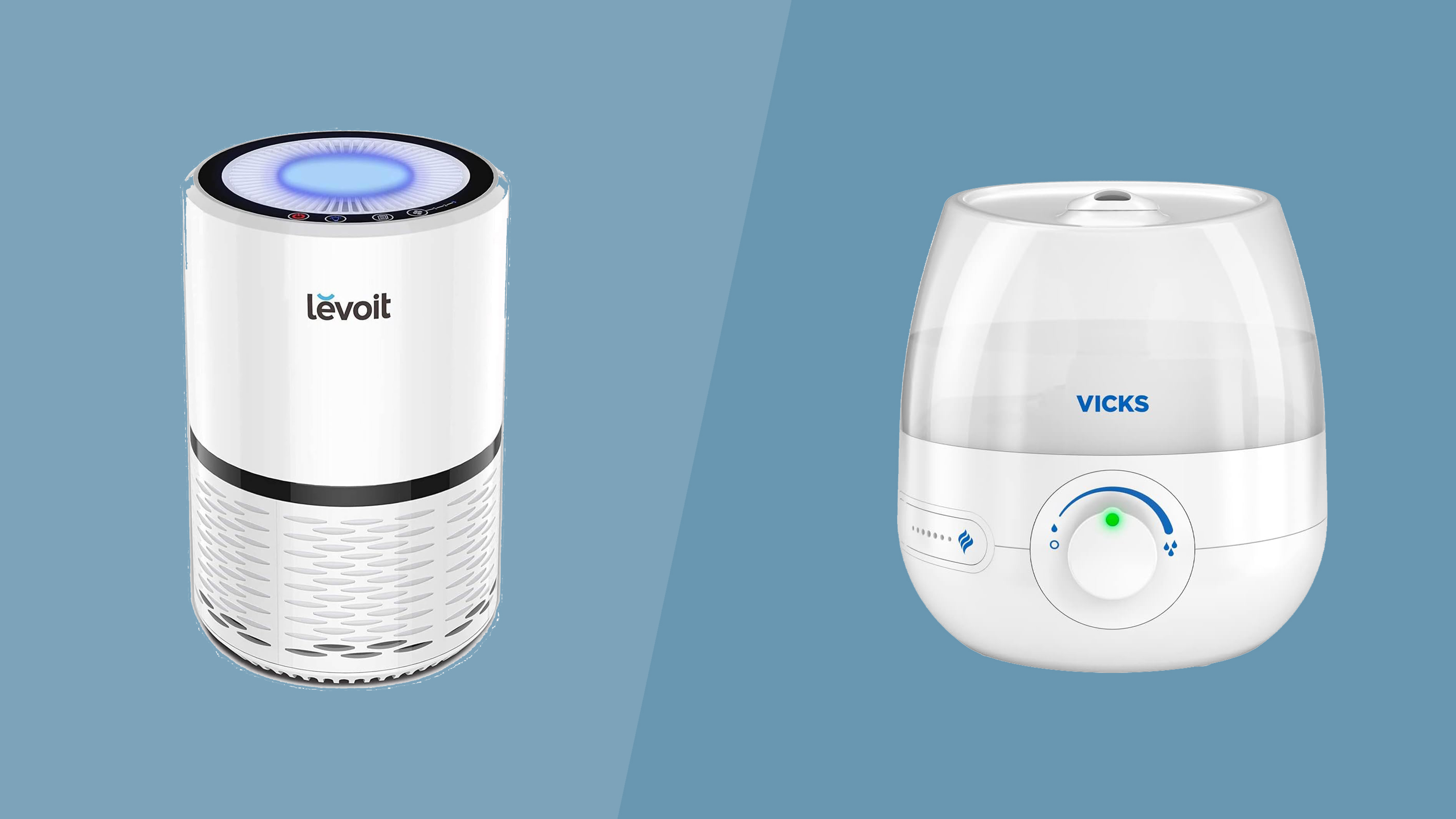
The air we breathe can have huge implications for our health. So, if you’re wondering whether you need an air purifier or humidifier in your home, you’re not alone.
Air purifiers and humidifiers both directly impact air quality. “Both can benefit your health depending on your needs,” explains our expert Mike Feldstein, a wildlife smoke and air quality educator from Austin, Texas.
The best air purifiers use a high-efficiency particulate air (HEPA) filter to remove pesky pollutants and allergens from your home, including dust, pet dander, mold spores, and smoke. “Air purifiers capture and filter out airborne particles, being especially beneficial in high-pollution areas and homes with allergy sufferers,” Mike says.
On the other hand, the best humidifiers release moisture into the air, increasing the humidity. For folks who live in dry climates, they can help you return to safe humidity levels, which the Centers for Disease Control and Prevention (CDC) estimates are between 30% and 50%.
“Humidifiers are often used in homes to ease the discomfort of dry noses, throats, lips, and skin. Adding moisture to dry air, they also help with common winter issues like static electricity, peeling wallpapers, and cracks in paint and furniture,” Mike explains.
So, which one is best for your home? We’ll explain exactly how these two appliances work, their main differences, and when you should use them.
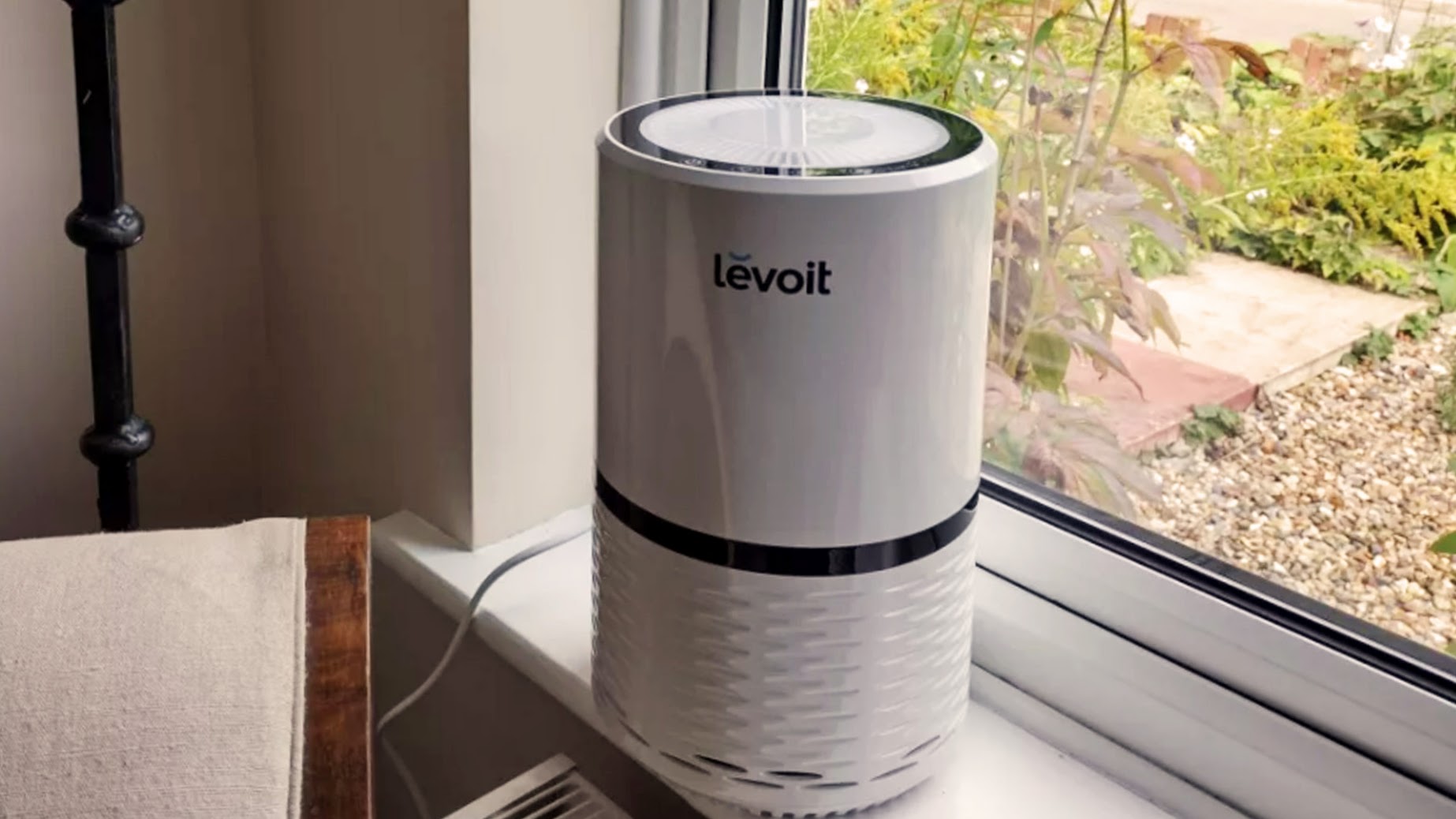
Air purifier vs humidifier: Price & value
Humidifiers are generally less expensive than air purifiers. However, the cost depends on the size of your space and whether you want to invest in premium features.
Sign up to receive the latest news, reviews, buying guides and deals direct to your inbox
Most home air purifiers cost between $90 and $400, depending on their room size capacity, features, and settings. At the lower end of the scale, the $90 Levoit H132 is a ‘personal’ model that can handle room sizes up to 258 square feet. Budget air purifiers like the H132 often offer very little customizability, although they can be handy for purifying the air in a home office or small kitchen.
Pricier air purifier models offer premium features such as smart settings, multiple fan speeds, and quiet modes. They also cover a larger space.
For example, the Mila Air Purifier costs approximately $400 and can purify up to 920 square feet. It also has eight speeds, smart features, a HEPA filter, and a white-noise mode.
What about humidifiers? Humidifiers typically cost $40 to $200. The only exception is a whole-house humidifier, which costs over $500 to buy and install professionally.
As with air purifiers, the price usually depends on the amount of square footage they can handle. This is also reflected in the water tank size.
For example, the Costway 6L Cool Mist Humidifier ($120) has a six-liter tank, whereas the Vicks Mini Cool Mist Humidifier ($40) only holds just under two liters.
Humidifiers also have ongoing maintenance costs. For most evaporative humidifiers, you must change the filter regularly and replace the evaporator pads annually.
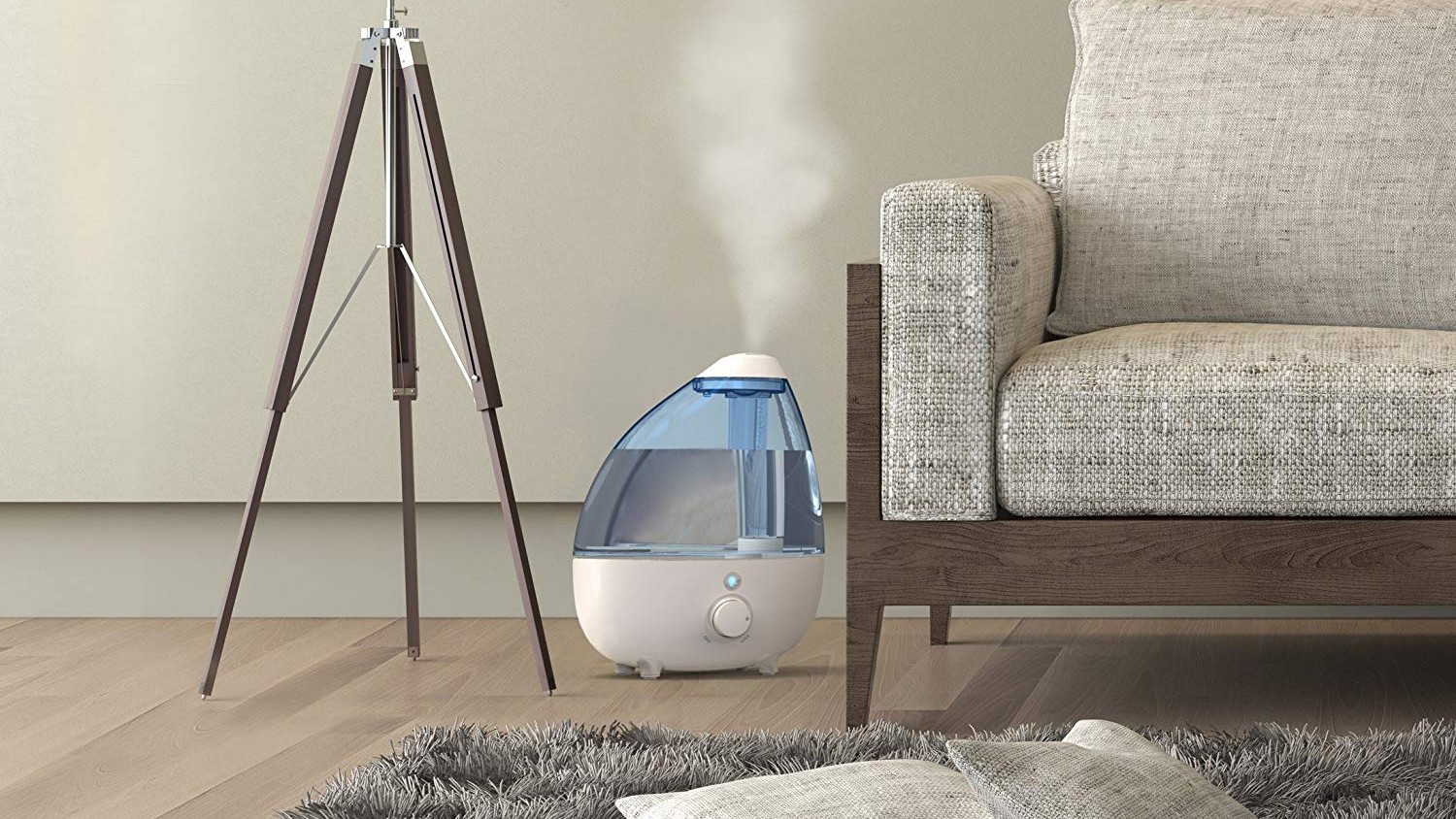
Air purifier vs humidifier: Features & functions
Air purifiers typically use a HEPA filter to trap airborne particles, releasing cleaner air back into the home.
Alongside a HEPA filter, the Clean Air Delivery Rate (CADR) is important, as this number specifies how quickly the model can purify air. The larger the room, the greater the CADR needs to be.
Premium air purifiers may allow you to add essential oils to inject a nice scent into your home or enable a quiet mode for work or sleep. They may also have fan speeds and smart features such as app compatibility and air quality sensors.
Humidifiers are a little more complex than air purifiers, as there are several different types.
Evaporative humidifiers are the most common mechanism. Air is passed over a wet wick, resulting in a cold, wet mist being ejected. However, the wick must be replaced regularly (costing around $10 each time).
Ultrasonic humidifiers move air over a vibrating element to form water droplets, which are released as a cold mist. They are generally quiet and energy-efficient.
Steam vaporizer humidifiers use a heated element to boil the water. As the device can get hot, it is unsuitable for homes with children or pets.
The larger the water tank size, the larger the space it can handle. For a large room (300 - 400 sq.ft.), a humidifier should also have a 20- to 30-pint capacity. For smaller rooms, 10 to 20 pints is fine.
Ideally, your humidifier should include an auto shut-off feature. The motor can overheat and start an electrical fire if the appliance is left running after the tank empties.
Desirable features include dual nozzles, digital displays, and multiple fan speeds. Some models also use ultraviolet light to kill bacteria.
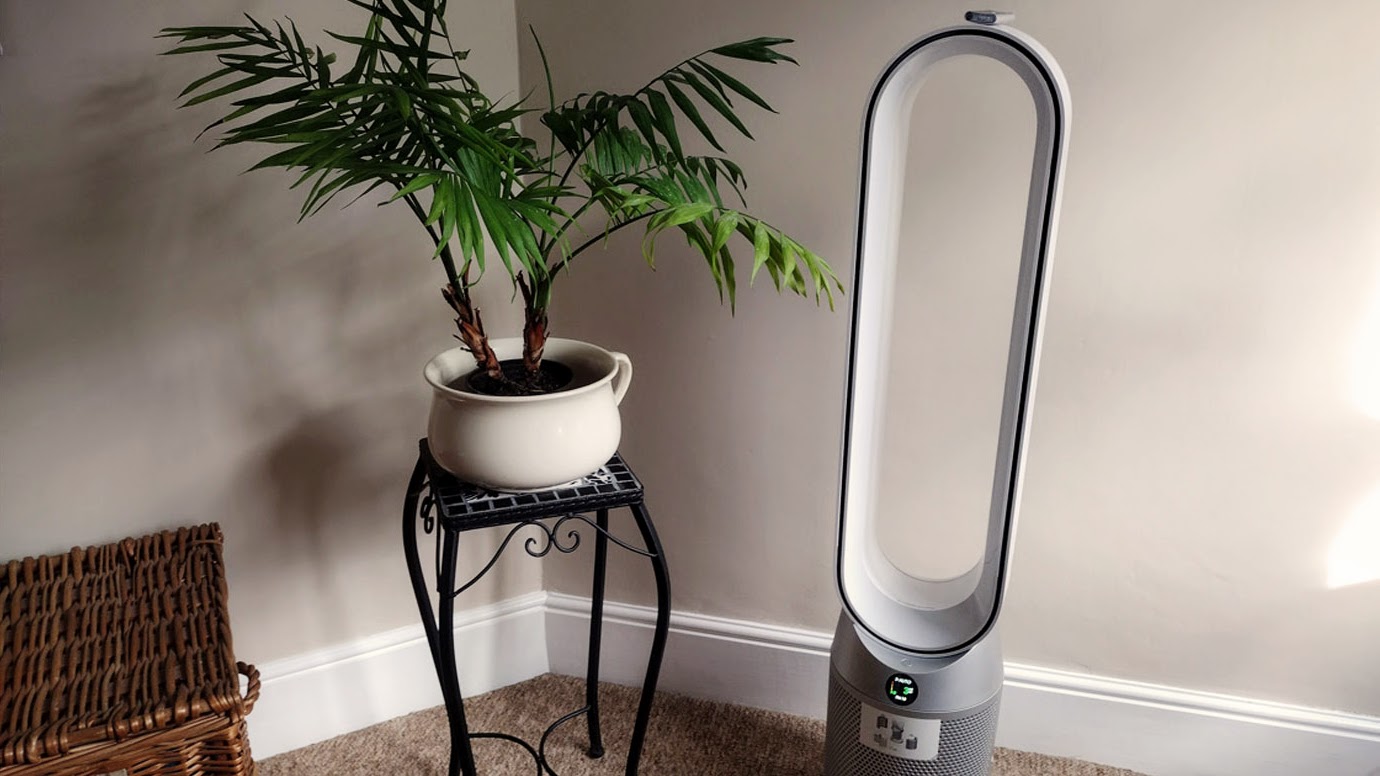
Air purifier vs humidifier: Performance
Air purifiers can effectively trap airborne pollutants, particularly if they have a HEPA filter.
According to the U.S. Environmental Protection Agency (EPA), HEPA filters can remove up to 99.97% of fine particles measuring up to 0.3 microns, including mold spores, dust, pollen, and bacteria.
However, air purifiers with other types of filters can be far less effective. We vigorously tested several air purifiers and found that the Levoit H132, a model with an activated carbon filter, only absorbed 68 to 96% of particles smaller than 0.3 microns.
In comparison, the Blueair Blue Pure 211+ Air Purifier, a model with a combined HEPA and activated carbon filter, absorbed 93 to 99.9% of particles smaller than 0.3 microns.
Humidifiers, on the other hand, are more consistent if they are set to an ideal humidity level. Most humidifiers last up to five years, although whole-house humidifiers can last 10 years or more.
If humidifiers are not maintained properly, they can lose their effectiveness over time. Most humidifiers need an annual evaporator pad replacement. The water tank also needs to be cleaned with water and soap (or disinfectant) once per week to prevent mold or mildew growth.
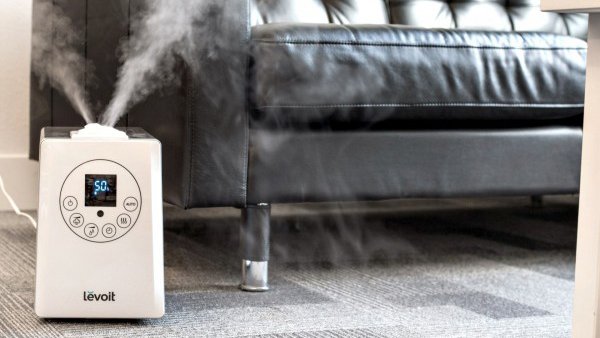
Air purifier vs humidifier: What the experts say

Based in Austin, Texas, Mike Feldstein is a wildfire smoke and air quality educator with more than 10 years of experience. He’s also the founder of Jaspr, a company dedicated to improving indoor air quality.
We called upon our expert, Mike Feldstein, to provide some extra insights on when you might want to use a humidifier or air purifier.
Mike doesn’t recommend using a humidifier alone: “Both devices can be used simultaneously, although I wouldn’t recommend using only a humidifier because it can cause issues if the water quality isn’t great, spreading bacteria and mold into the air.”
That brings us to the topic of hybrid devices. “The market is seeing a rise in hybrid devices that combine multiple functionalities - air purifying, humidifying, and dehumidifying.
“There is also a growing trend towards smart home technology. Consumers now prefer devices that offer smart features, such as app connectivity, air quality monitoring, and automated adjustments based on real-time conditions.”
Air purifier vs humidifier: FAQs
Is an air purifier or humidifier better for allergies?
While humidifiers can increase the moisture in the air, helping to prevent dry noses, throats, and eyes, air purifiers are better for people with allergies.
That’s because an air purifier with a HEPA filter can trap particles under 0.3 microns, such as pet dander, dust, and pollen.
Can I use an air purifier and humidifier at the same time?
Reviews
Whirlpool 24" Stainless Steel AI Dishwasher Review
Napoleon TravelQ PRO285 Portable Gas Grill review
Dreame L40 Ultra Robot Vacuum Cleaner and Mop review: almost hands-free cleaning
GE Profile Smart Mixer with Auto Sense review: a powerful, thorough mixer
Echo eForce DPB-2500 review: a leaf blower as a snow removal tool?
DPAS-2100 + Pro Paddle Attachment review: a new way to remove snow this winter?
Midea MAD53109APK 5.5QT Air Fryer review: a small, simple, and highly effective option
Eureka J15 Pro Ultra Robot Vacuum review: hands-free cleaning for busy families
Air purifiers and humidifiers can be used simultaneously to increase humidity levels and remove airborne pollutants.
Our expert recommends always using an air purifier alongside your humidifier. If the water quality is poor, it will help prevent bacteria and other pollutants from spreading around the home.
Can a humidifier interfere with an air purifier?
Some air purifiers use a paper-based filter, so too much moisture can interfere with the filtering process. Too much moisture can also promote mold growth around the air purifier’s filter.
This is most likely if the appliances are placed in close proximity or if the humidifier elevates the moisture levels in the room too much. Ideally, the appliances should be placed at opposite ends of a large room (or in separate rooms).
Air purifier vs humidifier: which is better?
Air purifiers and humidifiers are helpful additions to the home if you're looking to boost your air quality. While they can be used simultaneously, they work differently.
Humidifiers increase humidity in your home, helping to prevent cracked wood or wallpaper and dry noses, eyes, and throats.
Meanwhile, air purifiers improve air quality by trapping airborne pollutants such as mold spores, dust, pet dander, and smoke in a filter.
If helping with allergies or promoting cleaner air is your primary concern, you should look for an air purifier with a HEPA filter, which can trap particles as small as 0.3 microns.
You only need a humidifier if your home's moisture levels consistently fall under 30%. A humidifier can help bring your humidity levels back to a safe level (between 30 and 50%). When you're using a humidifier, just remember to clean the tank once per week, or consider using an air purifier to remove pollutants that might be caused by poor water quality.
Katie is a journalist who covers everything from hobbies to luxury travel and wellness. Also an editor for a luxury travel magazine, she is fascinated with the digital sphere and how it helps to inform and inspire people to get the most out of their lives.

